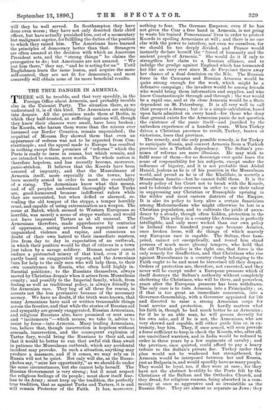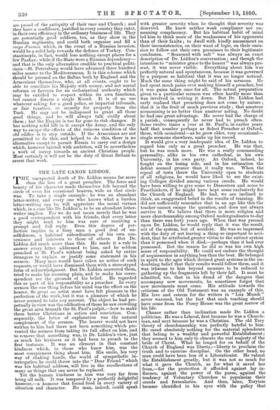THE TRUE DANGER IN ARMENIA.
THERE will be trouble, and that very speedily, in the Foreign Office about Armenia, and probably trouble also in the Unionist Party. The situation there, as we understand it, is of this kind. The Armenians are sinking into despair. All the promises made them at Berlin, in which they half-trusted, as suffering nations will, though they knew their chances were small, have been broken ; the Koords, who harass them worse than the reivers ever harassed our Border Counties, remain unpunished ; the acquittal of Moussa Bey showed them that even an appearance of redress was not to be expected from Con- stantinople ; and the appeal made to Europe has resulted in nothing except those promises of " reforms " which the Porte is ready to issue in reams, but which remain, and are intended to remain, mere words. The whole nation is therefore hopeless, and has recently become, moreover, panic-stricken. It believes that the Koords have been assured of impunity, and that the Mussulmans of Armenia itself, more especially in the towns, have been secretly armed in order to meet the eventuality of a rising. The Armenians know what this means, and of all peoples understand thoroughly what Turks are, good-humoured because indifferent rulers while they are unresisted, but when defied or alarmed, re- vealing the old temper of the steppe, a temper horribly cruel, and capable of using extermination as a weapon. The scene at Batuk, which seemed to Western Europeans so horrible, was merely a scene of steppe warfare, and would not have impressed Tartars as at all unusual. The Armenians therefore, made apprehensive by centuries of oppression, seeing around them repeated cases of unpunished violence and rapine, and conscious no doubt of their own hatred to their immediate masters, live from day to day in expectation of an outbreak, in which their position would be that of citizens in a town just taken by a savage soldiery. Human nature cannot endure a protracted misery of that kind, even if it is partly based on exaggerated reports, and the Armenians turn for help to the only men who will help them, to their own countrymen in Russia, who often hold highly in- fluential positions ; to the Russians themselves, always moved by Christian despair when it arises from Mussulman enmity ; and possibly to the Imperial family, which, from feeling as well as traditional policy, is always friendly to the Armenian race. They beg of all these for rescue, in accents not the less persuasive because of the necessary secrecy. We have no doubt, if the truth were known, that many Armenians have said or written treasonable things across the frontier, and that while the stories of Russian aid and sympathy are grossly exaggerated, Russian Armenians, and religious Russians also, have promised or sent arms and " incitements "—which means, we take it, advice to resist by force—into Armenia. Many leading Armenians, too, believe that, though insurrection is hopeless without arsenals, insurrection, and the consequent explosion of Tartar fury, would bring the Russians to their aid, and that it would be-better to run that awful risk than await in patience the Mussulman outbreak, which any accidental incident may provoke. In such a situation, anything may produce a massacre, and if it comes, we may rely on it Russia will not be quiet. Not only will she, as the Russo- phobes say, " seize her opportunity," as we should do under the same circumstances, but she cannot help herself. The Russian Government is very strong ; but it must respect the religions feelings of its people ; must show itself fear- less to its Army; must keep up the tradition, the perfectly true tradition, that as against Turks and Tartars, it is and will remain Protector of the Faith. It has, moreover, nothing to fear. The German Emperor, even if he has not given the Czar a free hand in Armenia, is not going to waste his trained Pomeranians' lives in order to protect Koords in spoiling Armenians at will ; and there is no one else with the power to interfere, not even we ourselves, for we should be too deeply divided, and France would instantly declare herself the " friend of humanity and the ancient people of Armenia." She would do it if only to strengthen her claim to a Russian alliance, and to indulge the grudge against England which has tormented her like an envy ever since M. de Freycinet threw away her chance of a dual dominion on the Nile. The Russian force in the Caucasus and Russian Armenia would be quite strong enough for the work, which might be a defensive campaign • the invaders would be among friends who would bring them information and supplies, and who know Constantinople through and through ; the war would be a rapid one, and at its close Armenia would be a State dependent on St. Petersburg. It is all very well to call that prospect a dream ; but it is a simple calculation, based upon facts admitted on every hand—for those who deny that ground exists for the Armenian panic do not question the existence of the panic itself—and justified by the unbroken experience of a hundred years. When Turkey drives a Christian province to revolt, Turkey, beaten or victorious, loses that province.
The remedy, and the only possible remedy, is for Turkey to anticipate Russia, and convert Armenia from a Turkish province into a Turkish dependency. The Sultan's pro- mises of reforms are mere illusions. He may wish to fulfil some of them—for no Sovereign ever quite loses the sense of responsibility for his subjects, except under the influence of bigotry, and it is not probable that Abdul Hamid, jealous as he is of his position in the Mussulman world, and proud as he is of the Khalifate, is secretly a Mussulman fanatic—but he cannot fulfil them. It is the steady policy of his Court not to break with the Koords, and to tolerate their excesses in order to use their valour in suppressing any Christian or Russophile uprising in the wilder and most eastern districts of the Empire. It is also its policy to keep alive a certain fanaticism among Mahommedans who might otherwise be lost in a Christian population, and to cultivate the pride of ascen- dency by a steady, though often hidden, protection in the Courts. This policy in a country like Armenia is perfectly intelligible, and only more wicked than our own policy in Ireland three hundred years ago because Asiatics, once broken loose, will do things of which scarcely any European race is capable. The Sultan, thus ham- pered, cannot act energetically, and round him stand persons of much more gloomy tempers, who hold that . the old Turkish policy is the right one, that force is the only remedy for disaffection, and that Christians who rise against Mussulmans in a country clearly belonging to the Faith ought to be and must be terrorised till they despair, Orders of protection are, therefore, not executed, and they never will be except under a European pressure which of itself destroys the Sultan's authority without completely sheltering the Christians, who will be there, and powerless, years after the European pressure has been withdrawn. The only cure is to turn Armenia into a Principality ; or, if that is too great an immediate concession, into a Governor-Generalship, with a Governor appointed for life and directed to raise a strong Armenian corps for local service and protection. It hardly matters what his faith is, though he had much better be an Armenian ; for if he is an able man, he will govern decently for his own sake, and if he is not, the Armenians, who are very shrewd and capable, will either guide him or, in ex- tremity, buy him. They, if once armed, will soon provide a force sufficient to keep in check the Koords, who, after all, are uncivilised warriors, and in India would be reduced to order in three years by a few regiments of cavalry ; and the province, once quieted, could afford to pay a heavy tribute to the Sultan's private fisc. Turkey under this plan would not be weakened but strengthened, for Armenia would be. interposed between her and Russia, just as Bulgaria is, and would speedily have as many people. They would be loyal, too, if they were at ease ; for they have not the abstract hostility to the Porte felt by the Christians of the Balkan and the Orthodox Church, and they dread, for religious reasons, being absorbed in a com- munity at once so aggressive and so irresistible as the Russian Slay. They are almost as separate as Jews ; they are proud of the antiquity of their race and Church ; and they have a confidence, justified in every country they enter, in their own efficiency in the ordinary business of life. They are potentially good soldiers, too, as they show in the Russian regiments, and could both organise and fill a corps d'armee which, in the event of a Russian invasion, would be a solid help towards the defence of Turkey. Con- stantinople, in fact, would lose nothing except places for a ' few Pashas ; while if the State were a Russian dependency- . and that is the only alternative credible to practical politi- cians—St. Petersburg would have advanced three hundred miles nearer to the Mediterranean. It is this scheme which should be pressed on the Sultan both by England and the 'Armenians themselves, who, at all events, ought to be able to conciliate his Majesty with money, and not unreal reforms or favours for an ecclesiastical authority which may be entitled to respect within its own functions, but cannot disarm a single Koord. It is of no use whatever asking for a good police, or impartial tribunals, or fair taxation, or security for property from the Turk. He may not be indisposed to grant all those good things, and he will always talk civilly about them ; but the Empire is too far gone to risk changes. It has nothing solid left in it except the Army, and the only way to escape the effects of the ruinous condition of the old edifice is to step outside. If the Armenians are not permitted to do this, and helped to do this, there is no alternative except to permit Russia to carry out a design which, however tainted with ambition, will be nevertheless a work of mercy towards an ancient Christian people. Most certainly it will not be the duty of Great Britain to arrest that work.







































 Previous page
Previous page